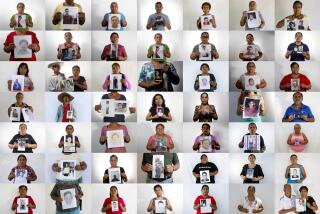‘Los Desaparecidos’ Are Returning to Haunt Gen. Pinochet
Gen. Augusto Pinochet has just been deliciously trapped in the web of his own perversity. When Chile’s former dictator made thousands of political prisoners disappear into the night and fog of his dictatorship, leaving them without a burial, not even in his saddest nightmares could he have anticipated the joke that history was going to play on him: That many years later, those very disappearances would lead a court in Chile to interpret the disappearance of those prisoners as a case of kidnapping, the sort of crime that is ongoing and perpetual, a violation of life and liberty that will continue until the bodies of those abducted appear.
Thus stripped of his self-granted parliamentary immunity, the way is open for Pinochet to at last be judged in the country that he ruled for 17 years.
The obstinate practice of denying families the bodies of their murdered relatives must have originally seemed like a brilliant idea to Pinochet and his disciples. The authorities could kill their adversaries and not be held accountable for those killings, invest themselves with the total power over life and death and yet simultaneously cleanse themselves with an official denial, insisting that there were no prisoners and that their disappearance was an invention of troublemakers.
And so habeas corpus can be rejected because there is, to put it bluntly, no corpus. No body. Dead or alive. And therefore no evidence and no crime.
But there was, on the other hand, terror because everybody in Chile understood what was really happening in nearby basements and remote deserts. Happening interminably: That is the sick logic of that repression.
When Pinochet condemned the relatives to the inferno of absolute uncertainty about the fate of the people they loved, he was forcing them and the rest of Chile to imagine, over and over again, those unnameable things that were being inflicted at that very moment on the men and women held captive. As there was no body to lay to rest, there could be no mental rest either. Torture was transformed from something merely physical into an event that was repeated incessantly in each citizen’s inner world, paralyzing him or her with fear.
Those disappearances ended up symbolizing for many of us the vanishing of the country itself, the attempt to destroy forever the Chile of liberty we had once inhabited.
Pinochet was sure that he would never be taken to task or brought to trial for having violated our human rights so savagely. It was not only a matter of his being commander in chief of the army and having, therefore, the monopoly of armed power. He also absolved himself of any possible prosecution by dictating an amnesty for whatever crimes might have been committed during the most terrible years of his reign.
It is particularly marvelous, then, that it should be precisely those missing and supposedly dead bodies that have come back to haunt Pinochet, turning into the instrument of what might well be his punishment and that of his accomplices. To get off the hook, Pinochet will now have to prove that he killed or ordered the assassination of those prisoners; he would have to disinter them from the depths of their anonymous graves, drag them out of the rivers and the seas where they were cast. Then and only then could his own amnesty be applied to him. He would be freed because he had, admittedly, committed murder.
Poetic justice indeed: It is the general’s own extreme cruelty that has ended up ensnaring him.
This new development in the Pinochet case is the result of many factors, first and foremost the unending struggle of the relatives of the missing who refused to believe that their loved ones had died. They were accompanied in their search by vast groups of Chileans who understood that as long as those bodies were not given a real resting place so that mourning could commence, there would be no peace and no reconciliation. We should not forget, however, that this immense social movement had been demanding justice for many years without being heard.
What jerked the machinery of state in Chile into motion, made the democratic government and the judicial system, the army and the right-wing Pinochetistas, react, was the arrest of the general in London by order of the Spanish judge, Baltazar Garzon. The long extradition proceedings, besides establishing universally the principle that heads of state lack immunity when they have committed crimes against humanity, pressured Chileans to assume responsibility for their own problems and find ways of facing the human rights dilemmas that had been left unresolved for all these years. The shameful fact that the outside world was judging Pinochet while we had been unable to do so changed the moral climate of our country for good.
This new victory against impunity belongs above all to our disappeared, los desaparecidos, not only from Chile but from all over the planet, those men and women who refused to accept the destiny of oblivion and terror that a dictator dreamed for them, those men and women who are somehow still alive, beyond death, still accusing the man who thought he could extinguish them forever.
More to Read
Sign up for Essential California
The most important California stories and recommendations in your inbox every morning.
You may occasionally receive promotional content from the Los Angeles Times.









